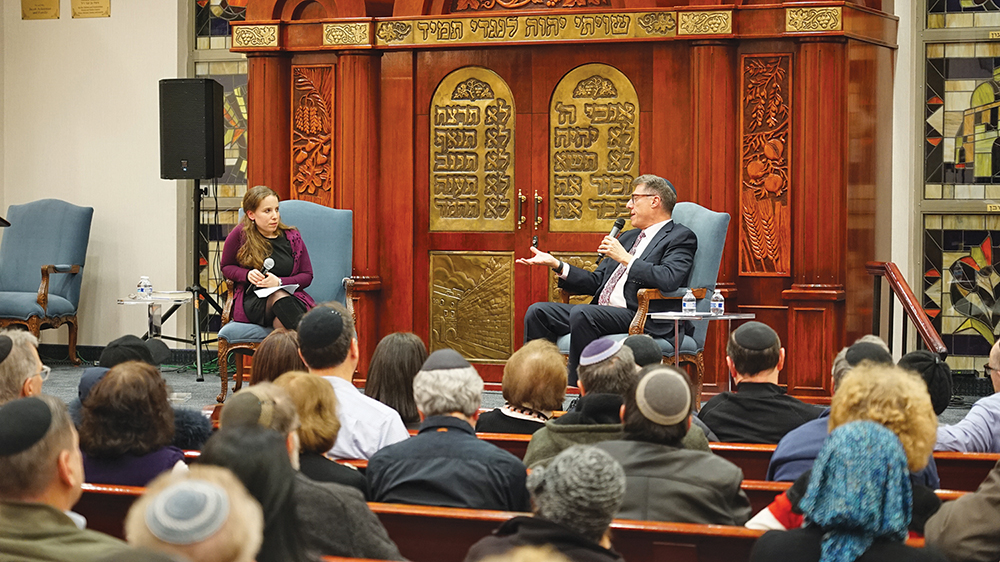
Yeshiva University’s Sacks-Herenstein Center recently hosted two events with Sacks Book Prize winner Dr. Daniel Gordis. The Sacks Book Prize 2023, funded by a generous gift from the Rohr Family, was awarded to “Impossible Takes Longer: 75 Years After Its Creation, Has Israel Fulfilled its Founders’ Dreams” (Ecco.) by Dr. Daniel Gordis. In the book, Gordis measures the successes and failures of Israel in its 75-year history against the founders’ aspirations as articulated in its Declaration of Independence.
The first event, “From Darkness to Light: Israel the Day After” was held on December 17 at the Young Israel of Lawrence-Cedarhurst with introductory remarks by YU President Rabbi Dr. Ari Berman and Dr. Erica Brown, director of the Sacks-Herenstein Center. In a conversation with Dr. Shira Weiss, assistant director, Gordis described Israel’s transformation of the existential condition of the Jew from the fearful individuals who had to depend on the conditional welcome of host countries—a welcome that invariably ran out—to the proud, self-reliant nation able to defend itself, as demonstrated valiantly in the past two months. He discussed leaning into mixed emotions, or dialectical thinking, regarding the negotiations to release hostages, affirming the need to rescue all captives, yet the hesitation to risk the lives of Israeli soldiers. Gordis reflected how Israel feels embraced by American Jewry and, in turn, supports Jewish communities across the U.S. in shared anguish during this time of antisemitic and anti-Zionist rhetoric and violence on college campuses and throughout the country. He speculated about what “the day after” would look like, both within Israel and in the country’s future involvement in Gaza.
On December 19, on YU’s Wilf Campus, Gordis presented “Negotiating the Impossible: The Israeli Hostage Crisis.” He grounded his presentation by explaining the purpose of Zionism, the national liberation movement of the Jewish people, and how Zionism failed to keep its promise on October 7 when Israelis were forced to hide or were taken captive, bringing the Jews’ past experience in Europe now to Israel. However, Zionism’s promise was to create a new Jew able to defend himself, and unlike the reactions of Jews following the pogroms in Europe, the Israeli response after October 7 was the mobilization of a strong, unified and resolved nation, armed with a sense of responsibility to hostages, distraught families, young widows and orphans.

Gordis discussed the existential nature of this war and how the impossibility of the hostage crisis is a microcosm of the impossibility of the larger conflict. Yet, at this tipping point in history, he asserted, Israel needs to win to fulfill the great dreams of Zionism. Even if it seems “impossible”… and even if it “takes longer.”
Rabbi Lord Jonathan Sacks, zt”l, the namesake of the book prize, wrote: “The day will come, when the story of Israel in modern times will speak not just to Jews, but to all who believe in the power of the human spirit as it reaches out to God, as an everlasting symbol of the victory of life over death, hope over despair. Israel has achieved great things. It has taken a barren land and made it bloom again. It’s taken an ancient language, the Hebrew of the Bible, and made it speak again. It’s taken the West’s oldest faith and made it young again. Israel has taken a tattered, shattered nation and made it live again. Israel is the country whose national anthem, Hatikva, means hope. Israel is the home of hope.” (Jonathan Sacks, “Israel: Home of Hope” CD)
May that day come very soon.
To watch recordings of both events, visit: https://www.yu.edu/sacksbookprize
The Rabbi Lord Jonathan Sacks-Herenstein Center for Values and Leadership, founded by Terri and Andrew Herenstein, is dedicated to disseminating the scholarship of Rabbi Sacks and Yeshiva University’s Torah core values through academic courses, conferences, leadership seminars, literary initiatives and executive education opportunities.
Dr. Shira Weiss is the assistant director of YU’s Sacks-Herenstein Center. She teaches Jewish Thought at Yeshiva University’s Bernard Revel Graduate School and has previously taught at Stern College for Women. Dr. Weiss holds a PhD in Jewish Philosophy and has been awarded fellowships from the National Endowment of Humanities, The Templeton Foundation, Ben Gurion and Oxford Universities. She is the author of Joseph Albo on Free Choice (Oxford, 2017), Ethical Ambiguity in the Hebrew Bible (Cambridge, 2018), and co-author of The Protests of Job: An Interfaith Dialogue (Palgrave, 2022).











